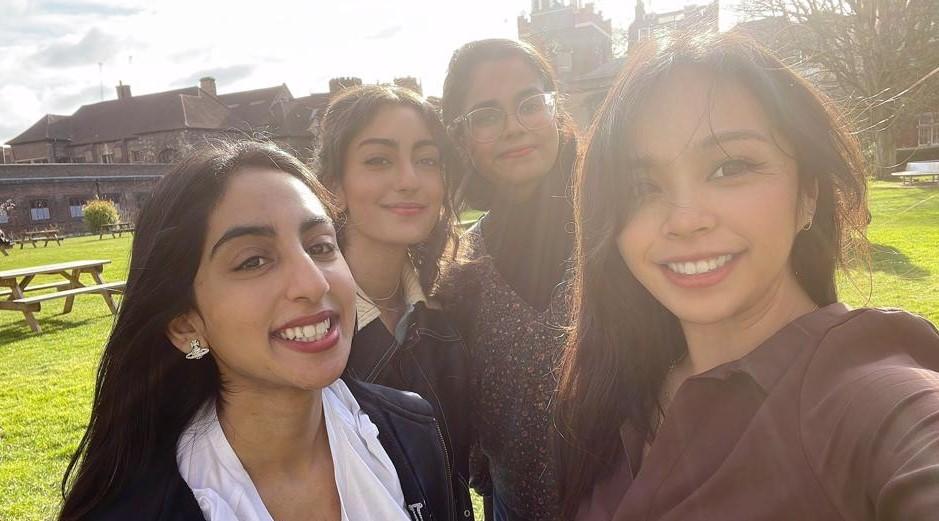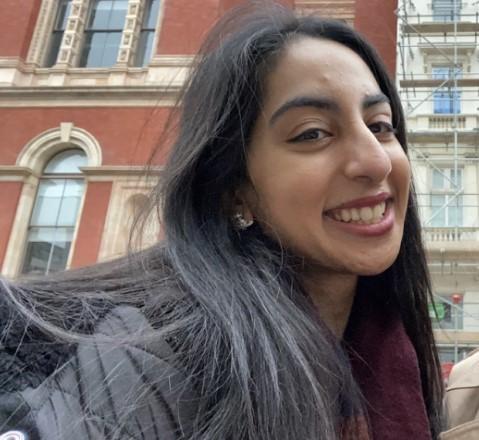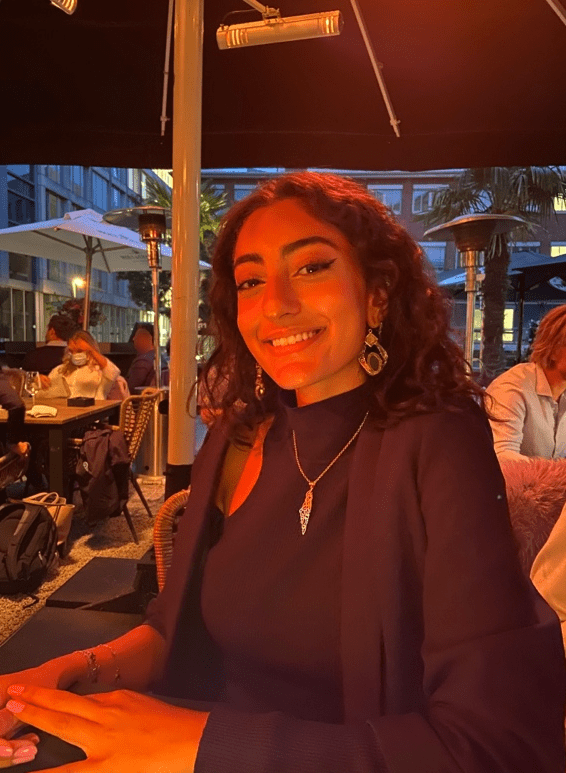International Day of Women and Girls in Science
Meet some of the MSc students at Barts Cancer Institute
Today (11th February) is International Day of Women and Girls in Science. At Barts Cancer Institute (BCI), Queen Mary University of London, we have many inspirational women working hard to accelerate progress in cancer research. Radhisha Kohombage, an MSc student at BCI, recently spoke to some fellow students, to hear more about their roles, inspirations, and advice for the next generation who would like to pursue a career in science.

Jasminemay Barcelon
 Bio
Bio
Jasminemay obtained a BSc in Physiological Sciences at University of California Los Angles (UCLA), where she started to focus on gynaecological oncology. With an interest in becoming a physician scientist, Jasminemay accomplished work experience in a gynaecology oncology clinic after which she decided to take on a master’s course in Cancer & Molecular and Cellular Biology at BCI. Jasminemay is also a student co-representative for her master’s degree, offering support to her fellow peers on the course.
What inspired you to pursue a degree in cancer?
What struck me most during my work treating patients at a gynaecology oncology clinic was seeing patient resilience and support from family and friends throughout their cancer journey. Those who were able to achieve remission, or become disease free for a period, relayed their drive to fall in love with life again. They participated in psychosocial support groups to help other patients undergoing active treatment. However, I saw some patients develop resistance to treatment, which amplified my passion to contribute to advancing treatments targeting resistance and learn more about those that are currently being investigated. Ultimately, I want to help in identifying early detection screening methods for gynaecological cancers, given that most gynaecological cancers have non-specific symptoms and typically become clinically present once the cancer has progressed.
What makes you proud to be a woman in science?
Being able to challenge society’s stereotypical depiction of what a scientist is. Now more than ever, young girls and women can internalise imposter syndrome. It is important for me to be able to support and exemplify women in science and assure that we can overcome any obstacle together and engage in a collaborative scientific culture with equal standing.
What research led by women at BCI excites you the most?
I find Dr. Michelle Lockley’s work on ovarian cancer very compelling, particularly her research on drug repurposing, which aims to improve treatment sensitivity and outcomes in patients whose cancer has become resistant to therapy.
Do you have any advice for girls who are thinking of pursuing a career or academic degree in cancer research?
If you are passionate for the subject, do it - and that applies to all disciplines. You should continue to stay curious yet be critical, and challenge what you believe in. By doing so, you may offer new and different insights to traditional treatments and recognise shortcomings that could present a large impact on cancer research.
Alishba Akbar
Bio
 Alishba achieved her BSc in Biomedical Sciences at the University of Westminster last year after wanting to pursue a career in medicine. Alishba has always found oncology within medicine a fascinating field, and with a love for working with children, she hopes to become a medic within paediatric oncology in the future. At BCI, Alishba is currently undertaking an MSc in Cancer and Clinical Oncology and acts as a student co-representative to support her fellow peers.
Alishba achieved her BSc in Biomedical Sciences at the University of Westminster last year after wanting to pursue a career in medicine. Alishba has always found oncology within medicine a fascinating field, and with a love for working with children, she hopes to become a medic within paediatric oncology in the future. At BCI, Alishba is currently undertaking an MSc in Cancer and Clinical Oncology and acts as a student co-representative to support her fellow peers.
What inspired you to pursue a degree in cancer?
During my bachelor’s degree, I read an article from UCL that focused on the effects of turmeric on cancer cell proliferation. I found this research very interesting and decided to complete my first research piece on this topic. I then began developing further interest in immunotherapy and paediatric oncology, the field in which I hope to specialise one day. Cancer devastates the lives of many and I think that clinical research is essential to improving outcomes in cancer patients. I believe there needs to be more emphasis on personalised medicine. With that said, there are many discoveries yet to be made, and I want to be part of the next generation of scientists that will pioneer future scientific breakthroughs.
What makes you proud to be a woman in science?
Being a woman in STEM alone is extremely fulfilling and inspiring. I am honoured to be a part of a prestigious institute like BCI, where there are many inspiring women leading exciting research and trials to advance cancer diagnosis and treatments.
What research led by women at BCI excites you the most?
I find the research led by Dr. Michelle Lockley very exciting; she is very charismatic and her work in a multidisciplinary team that facilitates better treatment plans for patients is not only fascinating, but also fuels my ambition for medicine. I also find Dr. Jane Sosabowski’s work on radiopharmaceuticals intriguing. Both Dr. Lockley and Dr. Sosabowski articulate their lectures on their respective field so brilliantly, which compels you to work harder. Seeing their respective journeys in research makes me believe I can achieve my own goals.
Do you have any advice for girls who are thinking of pursuing a career or academic degree in cancer research?
Never give up or think of yourself as unworthy - think of yourself as more than capable in achieving your ambition, and this ambition should stem from within. Never let anyone dull your spark and always do your best.
My final advice would be to read up on the latest publications and explore current scientific affairs.
Yara Alrokh
 Bio
Bio
Yara achieved her BSc in Biochemistry and Genetics at the University of Sheffield. Despite the unprecedented time, Yara describes her BSc journey as blissful with all its ups and downs. Yara has many accomplishments through her extracurricular activities but believes that her biggest achievements are yet to come throughout her academic journey and career. Yara is now at BCI, undertaking an MSc degree in Cancer & Molecular Pathology and Genomics where she acts as student co-representative to support her fellow peers on the course.
What inspired you to pursue a degree in cancer?
Cancer is a horrible disease and is very complex – the more you learn, the more your mind is blown. However, I feel that, somehow, you hear of more people around you suffering or dying from it. I want to be part of the next generation of scientists that is fighting against it; I know that being able to help and support patients with their cancer in any way I can will give me an unmatched rewarding feeling.
What makes you proud to be a woman in science?
I think women are generally underrepresented in many STEM fields, which can sometimes hold us back from wanting to pursue our passion. However, seeing the successful trajectory of many women in STEM, and in biological research specifically, creates a global support system that stimulates younger women to become part of the impactful army of scientists who are continuously progressing science, whether in small or large increments. So, it is pride-instilling to know I could one day inspire the younger generation as other women have inspired me.
What research led by women at BCI excites you the most?
I really like that current research is focused more on the tumour microenvironment (TME) and the interactions of the different components within cancer cells. I find this interesting as it has the potential of being applicable to different cancer types. There is lots of research related to the TME at BCI led by women, including Prof. Fran Balkwill who is looking into the links between inflammation and cancer, and how this plays a role in cancer progression. Prof. Kairbaan Hodivala-Dilke’s work on tumour stromal contributions to tumour growth and treatment efficacy is also fascinating, as well as Dr. Ioanna Keklikoglou’s work on microenvironmental cues that promote tumour metastases. Finally, work on adaptive therapy led by Dr. Michelle Lockley is very exciting; she is one of the first few scientists to explore this area in ovarian cancer and I look forward to seeing how this research progresses.
Do you have any advice for girls who are thinking of pursuing a career or academic degree in cancer research?
My advice is to read a lot, and attend workshops and talks, as this is the best way to stay up to date with new discoveries. Pursuing a degree or career in cancer research is going to be challenging but extremely rewarding. One of my favourite quotes by the poet Criss Jami applies in this circumstance and is “Persistence. Perfection. Patience. Power. Prioritize your passion. It keeps you sane”. With that said, it’s also important you remember to live and have a healthy work-life balance.
Article by Radhisha Kohombage, MSc student (MSc Cancer & Molecular and Cellular Biology, 2021-2022).
Category: General News, Interviews

No comments yet